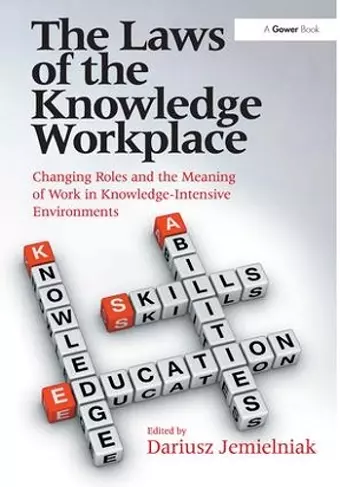The Laws of the Knowledge Workplace
Changing Roles and the Meaning of Work in Knowledge-Intensive Environments
Format:Hardback
Publisher:Taylor & Francis Ltd
Published:10th Sep '14
Currently unavailable, and unfortunately no date known when it will be back

In The Laws of the Knowledge Workplace, Dr Jemielniak has collected research-based chapters providing deep, interdisciplinary insight into knowledge professions, addressing issues of professional identity, emotion, power and authority, trust and indoctrination, and management behaviour. This leads to an examination of issues related to time and work scheduling and its bearing on play, family, symbolic sacrifices, and employee burn-out. In particular, it delves into the identity shifts between knowledge workers and managers, nepotism and turnover intentions among knowledge workers, the implementation of engineering projects, coordination problems in offshore production systems, leadership in virtual teams, decision support systems; taking into account the moral aspects of consequences, netnography as a tool for studying knowledge work, and innovative networks in the aviation industry. The accounts and studies in this book come from management, organization studies, sociology, and anthropology of work perspectives and are fully international in scope. They highlight the scale of the serious changes in occupational roles and to the meaning of work that is taking place in knowledge-intensive environments and give a pointer to what might constitute good and bad management practice in knowledge-intensive companies.
’The Laws of the Knowledge Workplace is not just another publication on a fashionable topic. It goes beyond the easy introduction of the knowledge work and knowledge workers concepts. The authors dig deeper, and in research-based chapters introduce work as perceived by the knowledge workers themselves. It focuses on the ways knowledge workers define, organize and make sense of their workplace. Moreover, it presents studies from different cultural contexts, and this international perspective is still insufficiently researched and described. In my opinion this book is critical reading for anyone who wants to understand the nature, and multidimensional character of knowledge work.’ Beata Glinka, The University of Warsaw, Poland ’Knowledge workers are praised as the most value-adding group of employees, and analyzed as gurus, hired guns or warm bodies. Their diploma-wielding and cappuccino-sipping clusters advance business companies to the ranks of knowledge-intensive organizations. But do we really know what knowledge workers do when they work? Jemielniak and his authors decided to listen to their stories. Do they enjoy a chance to be creative or deplore a collapse of a distinction between work and household time? What are the managerial lingos and employee power games between clouded onliners, the wizards of the world wide web, who trust but check? Virtual teams and virtual organizing are studied along with nepotism and networking, trust and professional identities, power and roles. Speaking of the laws of knowledge work betrays ambition to go beyond the functional, neopositivist paradigm of quantitatively biased mainstream research projects. Harvard’s labor and worklife program and Kozminski’s university sabbatical are among the establishment sponsors of this mildly subversive but strongly recommended collection of studies. All of them confirm that innovation becomes increasingly a collective game and that network leadership is one
ISBN: 9781472423887
Dimensions: unknown
Weight: 490g
178 pages